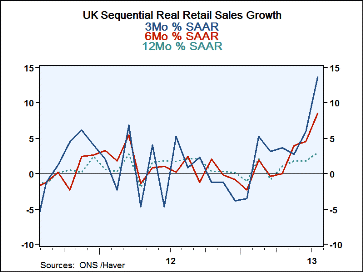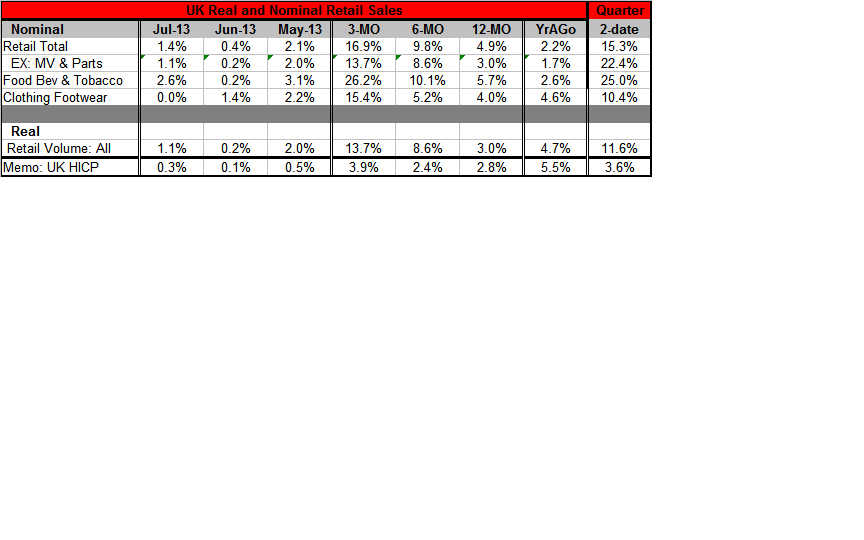 Global| Aug 15 2013
Global| Aug 15 2013Heat Wave Drives UK Retail Spending; What Is the Heat Source: Global Warming or Its Own Economic Engine?
Summary
UK economy continues to outperform statistics from the European Monetary Union. In in July the reason may be global warming. But I think the authorities in the UK will take improvement whichever way it comes. The heat wave in the UK [...]
 UK economy continues to outperform statistics from the European Monetary Union. In in July the reason may be global warming. But I think the authorities in the UK will take improvement whichever way it comes. The heat wave in the UK is being cited as the reason for a step up in spending. In July total retail spending moved up by 1.4% after rising 0.4% in June.
UK economy continues to outperform statistics from the European Monetary Union. In in July the reason may be global warming. But I think the authorities in the UK will take improvement whichever way it comes. The heat wave in the UK is being cited as the reason for a step up in spending. In July total retail spending moved up by 1.4% after rising 0.4% in June.
This is a terrific start to the growth of retail sales in the new quarter. If we take the July level and calculate the annualized growth rate from the center of the quarterly average for sales in Q2, we calculate a 15.3% annual rate of growth for retail sales to start the third quarter.
Excluding motor vehicles and parts, the gain in July was 1.1%, up from 0.2% in June. Its growth rate over the previous quarter is 22.4% at an annual rate. Similarly, food beverages and tobacco spending is up sharply in July, rising 2.6%; its three-month growth rate is an annualized 26.2% pace; its growth rate over the second quarter is a solid 25% annual rate. Clothing and footwear sales were flat in July, however, they still are growing at a 15.4% annual rate over three months and, in the quarter to date, they are still up at a 10.4% annual rate. UK retail sales are cooking: hot fun in the summer time!
Expressed in real terms, retail sales volumes in July rose 1.1%. They are rising at a 13.7% annual rate over three months, showing clear acceleration from twelve months to six months to three months. The gain in retail sales volume over the previous quarter is running at 11.6% annual rate.
The retail sales report fits in with a number of other UK reports, including second quarter GDP, which are performing well, better than expectations, and better than comparable data from the European Monetary Union. While the UK is plugged into the same economic system as the European Monetary Union members, significantly, its own particular system while linked to the EMU macro-economy, has its own currency, offering at a substantial degree of policy independence that EMU countries simply do not have.
While the Monetary Union also seems to have shaken off its recession there is still a great variation among the growth rates of its members as we chronicled in yesterday's report. The UK, contrarily, as a single unit with policy being made by a single central bank for its own circumstances has more flexibility than the ECB. That's been demonstrated now by the Bank of England's decision to press ahead with a policy based on forward guidance.
Consumer spending, consumer attitudes, housing prices, GDP, UK exports - a number of UK economic indicators- are pushing to higher levels, making the retail sales rise, while probably exaggerated by weather effects, still an authentic result.

Robert Brusca
AuthorMore in Author Profile »Robert A. Brusca is Chief Economist of Fact and Opinion Economics, a consulting firm he founded in Manhattan. He has been an economist on Wall Street for over 25 years. He has visited central banking and large institutional clients in over 30 countries in his career as an economist. Mr. Brusca was a Divisional Research Chief at the Federal Reserve Bank of NY (Chief of the International Financial markets Division), a Fed Watcher at Irving Trust and Chief Economist at Nikko Securities International. He is widely quoted and appears in various media. Mr. Brusca holds an MA and Ph.D. in economics from Michigan State University and a BA in Economics from the University of Michigan. His research pursues his strong interests in non aligned policy economics as well as international economics. FAO Economics’ research targets investors to assist them in making better investment decisions in stocks, bonds and in a variety of international assets. The company does not manage money and has no conflicts in giving economic advice.






